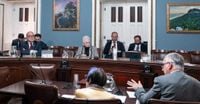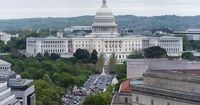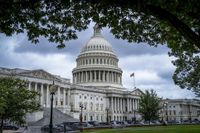In a rare and contentious move, Congress has passed a bill to rescind $9 billion in previously allocated funds, including $1.1 billion earmarked for the Corporation for Public Broadcasting (CPB). The decision, which narrowly passed the House of Representatives with a 216-213 vote and was approved by the Senate 51-48, marks a significant blow to public media institutions across the United States. The bill, now headed to President Trump for signature, effectively defunds NPR, PBS, and their member stations, raising deep concerns about the future of public broadcasting, especially in rural and underserved communities.
The Corporation for Public Broadcasting, established by Congress through the Public Broadcasting Act of 1967, serves as the primary steward of federal investment in public radio, television, and related digital services. Despite its modest appropriation—roughly one one-hundredth of a percent of the federal budget—CPB distributes more than 70% of its funding to over 1,500 locally owned public media stations nationwide. These stations rely heavily on CPB support to provide free, accessible programming and vital emergency alerts.
Alaska and Colorado exemplify the widespread impact of these cuts. Alaska’s 27 public radio stations, many of which depend on CPB funding as a lifeline, now face uncertain futures. Senator Lisa Murkowski of Alaska, one of the few Republicans opposing the bill, expressed grave concern for these rural stations. She noted, “I have no surety that these small stations that provide such important connections within their community are going to be able to stay afloat.” Murkowski’s efforts to preserve funding for rural stations, including an amendment to defund only NPR but keep money flowing to smaller broadcasters, failed despite bipartisan support from Senator Susan Collins of Maine.
Meanwhile, in Colorado, public radio stations like KRZA and KVNF face significant financial challenges. KRZA’s general manager, Gerald Rodriguez, who estimates that 40 to 50 percent of his station’s funding comes from CPB, lamented the impact: “It’s going to affect the local stations the most, and that’s what a lot of these communities depend on.” KVNF’s Ashley Krest echoed these concerns, highlighting that about 20 percent of their budget—roughly $161,000—was to come from CPB. She emphasized the importance of local programming and the station’s commitment to representing its diverse audience despite political pressures.
Colorado Public Radio (CPR), which receives about 6 percent of its budget from CPB, faces a loss of approximately $1.5 million. Stewart Vanderwilt, CPR’s president and CEO, warned that the cuts would have a ripple effect beyond just the stations directly impacted. “When local news is diminished or lost in a community — the public watchdog role of the press is muted and the potential for waste, fraud and abuse increases,” he said. “Cutting this funding reduces the ability to lift up local reporting to national audiences.”
Similarly, Rocky Mountain Public Media, which includes Rocky Mountain PBS, KUVO Jazz, and THE DROP, receives about 10 percent of its funding from CPB. Amanda Mountain, the organization’s president and CEO, described the cuts as a “devastating blow” that would harm public safety infrastructure, educational services, and reliable news in communities where commercial outlets are scarce.
St. Louis Public Radio (STLPR) also faces a substantial hit, losing $575,000 annually—6.2 percent of its revenue—due to the funding rollback. Interim General Manager Jess Luther called the vote “a targeted attempt to weaken one of the most trusted civic institutions in America.” Luther stressed that public media stations provide essential, nonpartisan services, especially in rural and underserved areas, including emergency alerts and educational resources. STLPR has launched an emergency campaign to rally community support and offset the losses.
At the national level, NPR CEO Katherine Maher labeled the cuts an “irreversible loss” to the public radio system, warning that the rollback disregards the public will and threatens “beloved local civic institutions.” She highlighted that public funding enables a uniquely American system of cultural, informational, and educational programming, accessible to all for about $1.60 per American annually. Similarly, PBS CEO Paula Kerger emphasized that the cuts “go against the will of the American people,” noting that PBS receives around 15 percent of its revenue through CPB and that the funding reduction will hit smaller and rural stations hardest.
The political battle over the funding was fierce. Conservative Republicans targeted NPR for what they perceive as a left-wing bias, a criticism amplified by controversies such as the 2024 resignation of NPR business editor Uri Berliner, who had criticized NPR’s editorial direction. Senator Susan Collins and Senator Lisa Murkowski, despite opposing the cuts, acknowledged conservative concerns but emphasized the need to protect local stations. Murkowski remarked, “Every time they spoke about public broadcasting in the negative they used words like, ‘It's a radical liberal agenda.’ And their reference was not to the emergency early warning system. It was not to the children's TV programming.”
Democrats decried the rescission process itself, which is rare and has not been attempted in decades. Representative Diana DeGette blamed Republican loyalty to President Trump for the cuts, warning that it would harm people globally through lost foreign aid and domestically by weakening essential public media. Senate Minority Leader Chuck Schumer called the rescissions package “an affront to the bipartisan appropriations process.”
The rescission also sparked concerns about the erosion of Congress’s constitutional control over spending. Senators Collins and Murkowski voiced unease that Republicans were ceding power to the executive branch, led by budget office director Russell T. Vought, who has aggressively sought to expand presidential control over federal funds, including freezing appropriations.
Despite the setback, some lawmakers hold out hope for future appropriations to restore funding. Republican Representative Don Bacon indicated that House Speaker Mike Johnson assured him local public TV stations would be funded in the next cycle, though details remain unclear. Senator Mike Rounds of South Dakota secured a deal to continue funding 28 tribal radio stations across nine states, but Native Public Media’s CEO Loris Taylor called the compromise “structurally impractical.”
Public media stations are now bracing for the financial impact and seeking alternative funding sources. Many smaller stations, especially those in rural or impoverished areas, face the daunting challenge of replacing federal funds with donations and underwriting—efforts complicated by smaller populations and limited resources. As Tami Graham, executive director of KSUT in southwestern Colorado, put it, “We're already in a news desert. Now having to make up that loss of support in a very rural area, it’s a challenging environment to be in right now.”
In Oregon and the Pacific Northwest, Oregon Public Broadcasting (OPB) faces a loss of roughly $5 million annually, about 9 percent of its budget. OPB plays a critical role as the State Primary Entry Point station for emergency alerts and serves over three million monthly engagements across radio, television, and digital platforms. OPB emphasizes that federal funding supports free, accessible news and vital public safety communications, especially for rural and remote communities.
As the bill awaits the president’s signature, public media advocates nationwide are mobilizing to protect the future of community-focused journalism and programming. The cuts threaten to accelerate the growth of news deserts, diminish access to emergency information, and erode the civic fabric that public broadcasting has long nurtured.
The debate over these cuts underscores a broader struggle over the role of public media in American society and the balance of power between Congress and the executive branch. With millions of Americans relying on public broadcasting for trustworthy news, educational content, and emergency alerts, the stakes could not be higher.






